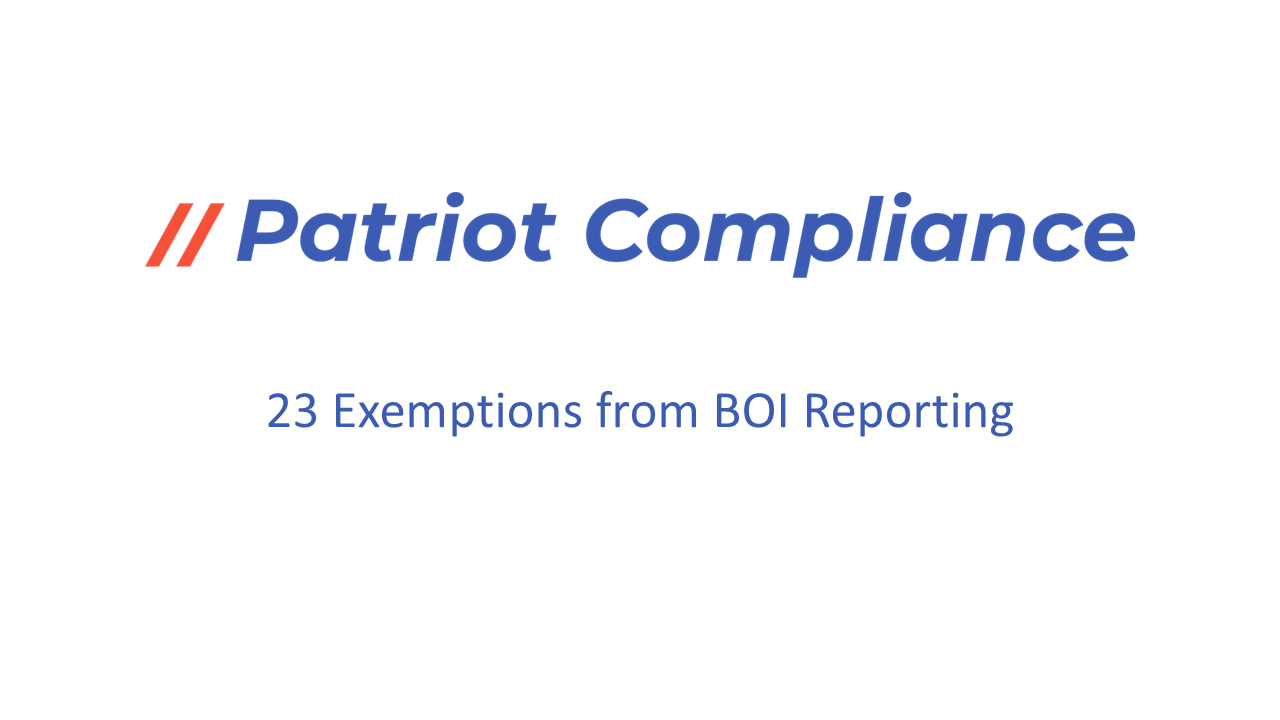
The 23 Exemptions from BOI Reporting Under the CTA
Navigating the Exemptions
Oct 24, 2024
The Corporate Transparency Act (CTA) now requires many companies to disclose their beneficial ownership information (BOI) to the Financial Crimes Enforcement Network (FinCEN). However, the CTA includes 23 specific exemptions, sparing some entities from BOI reporting. One of the most notable exemptions is the large operating company exemption. This post will examine this exemption and the others that provide relief to certain entities. The federal rule setting out the full list of exemptions can be viewed here.
Large Operating Company Exemption
The large operating company exemption is one of the most prominent and significant among the 23 exemptions. This exemption is available to companies that meet all the following criteria:
Employee Count: The company must employ more than 20 full-time employees in the U.S. (this analysis can be detailed, but generally, an employee will be deemed full-time if they work 30 hours per week in a particular month or 130 hours per month regardless of hours per week in that month)
Physical Office Space: The company must have a physical office within the U.S.
Revenue Requirement: The company must report more than $5 million in annual gross receipts or sales on its federal income tax return.
The rationale behind this exemption is that large, well-established companies are generally considered to have sufficient transparency and oversight mechanisms already in place. They also tend to be subject to other rigorous regulatory requirements, reducing the need for further BOI reporting under the CTA.
Other Key Exemptions
The remaining 22 exemptions cover a variety of specific situations, providing relief to entities where the risk of misuse for illicit purposes is deemed lower. The following is a list of the other exemptions. This list is a general summary, please note that the rules and regulations related to each entity-type are extensive. Reporting Companies that believe they may be exempt should review the rules and regulations in detail and seek competent legal advice.
1 Securities Reporting Issuer
2 A Governmental Authority
3 Banks
4 Credit Unions
5 Depository Institution Holding Company
6 Money services businesses (e.g., entities registered with FinCEN)
7 Broker or Dealer in Securities
8 Securities Exchange or Clearing Agencies
9 Other Exchange Act Registered Entity
10 Investment Company or Investment Adviser
11 Venture Capital Fund Adviser
12 Insurance Company
13 State-licensed Insurance Producer
14 Commodity Exchange Act Registered Entity
15 Accounting Firm
16 Public Utility
17 Financial Market Utility
18 Pooled Investment Vehicle (if operated or advised by a bank, credit union, securities broker or dealer, investment company or investment adviser, or a venture fund adviser)
19 Tax-exempt entity
20 Entity Assisting a Tax-Exempt Entity
21 Subsidiary of Certain Exempt Entities
22 Certain Inactive Entities
Implications of the Exemptions
These 23 exemptions minimize unnecessary reporting burdens while ensuring that high-risk entities remain under FinCEN’s watchful eye. For many, the large operating company exemption is especially relevant, as it allows sizable companies to avoid BOI compliance requirements. A review of internal governance and recordkeeping policies is essential for exempt entities, as FinCEN may still require information to confirm eligibility for an exemption.
Don’t forget, the CTA requires entities to amend reports when changes occur. To that end, a company initially exempt from reporting may lose the exemption in certain circumstances, such as when the number of full-time employees drops. When that happens, the entity loses the exemption and must file a BOI report with FinCEN in a timely manner.